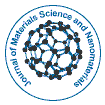Nosso grupo organiza mais de 3.000 Séries de conferências Eventos todos os anos nos EUA, Europa e outros países. Ásia com o apoio de mais 1.000 Sociedades e publica mais de 700 Acesso aberto Periódicos que contém mais de 50.000 personalidades eminentes, cientistas de renome como membros do conselho editorial.
Periódicos de acesso aberto ganhando mais leitores e citações
700 periódicos e 15 milhões de leitores Cada periódico está obtendo mais de 25.000 leitores
Links Úteis
Diários de acesso aberto
Compartilhe esta página
Abstrato
Analysis as a Micro Fibrous Graft for Components in Synthetic Biology
Kyaw Myo Zaw
A biocompatible and biodegradable poly (1,4-butylene succinate) microfibrous tubular scaffold has been produced through the use of electrospinning.The scaffold’s morphology was N-optimized to prevent cell infiltration through the graft’s wall and to promote cell integration, adhesion, and growth as a micro-porous conduit with a small diameter.The scaffold’s mechanical properties and morphology were examined and compared to those of native conduits.Scaffolds were then seeded with adult normal human dermal fibroblasts to test cytocompatibility in vitro.The hemolytic effect was assessed following incubation with whole blood that had been diluted.The graft is able to provide initial mechanical support and functionality thanks to the demonstrated degradation profile during colonization and subsequent replacement by host cells. Elastic modulus (less than 17.5 1.6 MPa), ultimate tensile stress (less than 3.95 0.17 MPa), strain to failure (less than 57 4.5%), and suture retention force (less than 2.65 0.32 N) were all within the physiological range for tubular conduits. There was no delamination of the scaffold’s mechanical properties.This combination of properties may make it possible to use PBS as a biomaterial to create scaffolds that support host cell remodelling and provide structure and function over time.
Diários por Assunto
- Agro e Aquicultura
- Alimentação e Nutrição
- Bioquímica
- Ciência da Computação
- Ciência de materiais
- Ciencias ambientais
- Ciências Clínicas
- Ciências Farmacêuticas
- Ciências gerais
- Ciências Médicas
- Ciências Sociais e Políticas
- Ciências veterinarias
- Economia e Contabilidade
- Enfermagem e cuidados de saúde
- Engenharia
- Engenheiro químico
- Física
- Genética e Biologia Molecular
- Geologia e Ciências da Terra
- Gestão de negócios
- Imunologia e Microbiologia
- Informática
- Matemática
- Química
Revistas clínicas e médicas
- Anestesiologia
- Assistência médica
- Biologia molecular
- Cardiologia
- Cirurgia
- Dermatologia
- Diabetes e Endocrinologia
- Doenças infecciosas
- Enfermagem
- Fisioterapia e Reabilitação
- Gastroenterologia
- Genética
- Hematologia
- Imunologia
- Medicamento
- Medicina Reprodutiva
- Microbiologia
- Nefrologia
- Neurologia
- Odontologia
- Oftalmologia
- Oncologia
- Ortopedia
- Pediatria
- Pesquisa Clinica
- Pneumologia
- Psiquiatria
- Toxicologia

 English
English  Spanish
Spanish  Chinese
Chinese  Russian
Russian  German
German  French
French  Japanese
Japanese  Hindi
Hindi